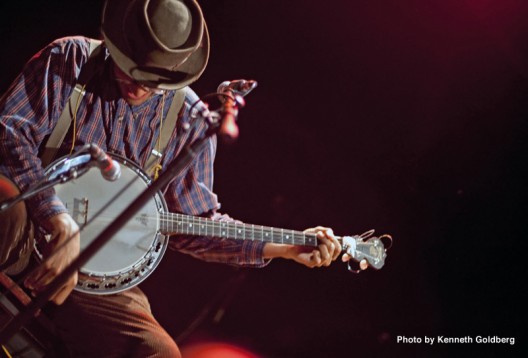

|
|
|
With their 2010 Nonesuch debut, Genuine Negro Jig—which garnered a Best Traditional Folk Album Grammy last year—the Carolina Chocolate Drops proved that the old-time, fiddle and banjo-based music they’d so scrupulously researched and passionately performed could be a living, breathing, ever-evolving sound. Starting with material culled from the Piedmont region of the Carolinas, they sought to freshly interpret this work, not merely recreate it, highlighting the central role African-Americans played in shaping our nation’s popular music from its beginnings more than a century ago. The virtuosic trio’s approach was provocative and revelatory. Their concerts, The New York Times declared, were “an end-to-end display of excellence… They dip into styles of Southern black music from the 1920s and ’30s—string-band music, jug-band music, fife and drum, early jazz—and beam their curiosity outward. They make short work of their instructive mission and spend their energy on things that require it: flatfoot dancing, jug playing, shouting.”
On Leaving Eden, produced by Nashville stalwart Buddy Miller—the go-to guy for artists ranging from Robert Plant to Emmylou Harris—and recorded in his home studio, the Carolina Chocolate Drops illustrate their own adaptability to growth and change as the original lineup expands from three to five players for this recording and their new repertoire incorporates more blues, jazz and folk balladry alongside brilliantly rendered string-band tunes. The group’s founding members Rhiannon Giddens and Dom Flemons, both singers and multi-instrumentalists, were used to working together (CCD had evolved out of their previous group, Sankofa Strings) but they needed back-up for their second full-length Nonesuch disc. Help came in the form of three new players: beat-boxer Adam Matta, introduced to the band by their friends in NYC’s Luminescent Orchestrii (with whom they’d released a live EP on Nonesuch in 2011) and Brooklyn-based guitarist, banjo player and singer Hubby Jenkins and New Orleans-based cellist Leyla McCalla, both of whom the band had befriended via the Music Maker Relief Foundation, which helps to support elder roots artists and encourage young talent. Jenkins is now a full-time member of the group; Matta, after touring with CCD throughout 2011, will make occasional guest appearances; and McCalla will round out CCD’s 2012 touring line-up.
Flemons points out: “There’s a new diversity that comes from the new ensemble. My thought process of how I put together songs for the Carolina Chocolate Drops now is more like working with a jazz group. I could make it work in any sort of way. Based on the players that you have, you can do different things with the arrangements. It was helpful that Hubby also played guitar. Up to then, I was the only one in the group who worked with chords. Rhiannon plays her instruments melodically instead of around chords and the rhythm of the chords. I had been working on ‘Mahalla’ [an arrangement of a joyfully upbeat piece from spoon-wielding South African slide guitarist and YouTube phenomenon Hannes Coetzee] for a while on my own, just on the banjo, and I would have liked to have guitar on it too, but I couldn’t get anyone to back me up. Hubby happened to know the song as well, so that track came out of Hubby being there. Adam brought a great, pumping bass vocal part to ‘Po’ Black Sheep,’ and ‘Country Girl’ also has Adam’s particular flavor—along with Leyla’ s cello.”
Title track “Leaving Eden”—written by Giddens’ friend and fellow Greensboro, North Carolina resident, Laurelynn Dossett—had long been on Giddens’ to-do list, but until now it hadn’t found a place in CCD’s set. With this new lineup, its time had come, and the song became the veritable centerpiece of the album. McCalla’s cello lends gravity to this elegiac number about the falling fortunes of a mill town, sung with plainspoken eloquence by Giddens, one of several stunning vocal performances from this Oberlin Conservatory-trained singer.
Giddens brings a hip hop-style, declamatory flair to her self-penned “Country Girl,” egged on by Matta’s beat-boxing; she takes an overtly bluesy turn on Ethel Waters’ wry 1920′s-era confession, “No Man’s Mama;” and concludes the album with a powerful a capella rendering of “Pretty Bird” by the late Hazel Dickens, the West Virginian bluegrass singer-songwriter and activist (and spouse of roots music champion Mike Seeger). Giddens admits, “It’s not in the style I usually sing in. I first heard that song about seven years ago. I was in Scotland and I checked this CD out of the Edinburgh library, and I thought it was awesome. This song is not one I perform a lot because it’s so intense; I’ve only done it on stage a handful of times. Hazel had just passed recently, so I pulled the song out and said, ‘Hey, Buddy, how about this?’”
Miller had come recommended by several colleagues whose opinions Flemons and Giddens trusted, but, for Flemons, knowing that Miller had produced the late Solomon Burke’s Nashville album sealed the deal. The easy-going Miller served as editor and arbiter over the course of two separate weeks of sessions, as the revamped group pored through existing repertoire and new ideas. The performances were all captured live in Miller’s home studio, with everyone playing together in one room, resulting in a recording that has a palpable warmth and immediacy as these players found an instinctive, unified groove. As Flemons recalls, “When we did the first session with Hubby, Adam, Rhiannon and myself, we just cut everything we’d put together in the short period we had. From there, we had about half a record’s worth of stuff and we all had to take a step back and think about how we wanted to approach the rest of it. When we went back to Nashville, we rented an old house and did a week-long rehearsal. It was a melee of tunes, everything we were thinking about. We had about 18 tunes on top of the ones we’d already recorded and we gave them to Buddy; he sat down and figured out what pieces he thought would be the most effective. We went back to the studio in Buddy’s house again and did another week’s worth of recording, and that was the rest of the record. We worked until the last possible minute.”
The neophyte Jenkins, who learned his craft busking on the streets and in the subways of New York City, admits the first session, for him, was initially “very nerve wracking. I had only been in the group a month. I was still getting to know these people and they were getting to know me. It was a week when we got to really dig into each other’s musical philosophies and the way we think about music and approach music and how we can mix those together and just bond. And the first recording session turned out to be just great. Buddy’s style is very open, he’ll let something happen and watch something grow. That was definitely necessary for us on that session. Before the next session we spent a week where we just played together. We each brought some songs and sat around every day and when through them, bounced ideas off each other, got excited about things. And I felt like that was really the key to creating the band’s sound, that one week in Nashville when we had the house together and just played every day. By the time we came in for the second recording session, we had a more concrete idea of who we were as a band and what we wanted to do with that sound. And Buddy Miller was ready to take it on.”
Though often striking out in new directions, CCD return to familiar turf with tracks like “Riro’s House,” a traditional piece they’d learned from their mentor, 90 year-old North Carolinian fiddler Joe Thompson, and “West End Blues,” paying tribute to the venerable Piedmont guitarist and banjo player Etta Baker. Once again they break out such unique instrumentation as jugs and bones; Giddens records for the first time with a 5-string cello (or bass) banjo, while Flemons employs his quills, a pan-pipe instrument of African origin with a distinctive Irish pennywhistle lilt to it
“We want to remain true to the roots of how we started,” Giddens explains. “We’re always going to have a string band on our records. But we don’t want to just do Piedmont style fiddle-banjo-guitar tunes; there’s more to our musical life than that. We grow in a healthy, slow way that reflects our true development as musicians and as a band.” Over the past year, CCD have played to a remarkably wide range of concert-goers, with appearances at the Newport Jazz Festival, the Grand Ole Opry, the Cambridge Folk Festival in London and as part of the Dave Matthews Band Caravan, among many other events. Continues Giddens, “We’ve held on to our original fans and we’ve now got a lot more younger people coming to our shows and more people of color, which is fabulous. We’ve been working off that actively, doing stand-up shows where we cut the talking down a bit, keep the tunes coming, and get everybody dancing. And we still have our shows where we sit and talk about the material, do our slow waltzes and stuff like that. It keeps everything flowing.”
— Michael Hill
| Date | Venue | City | State | Note |
|---|---|---|---|---|
| No Tour Dates Available | ||||